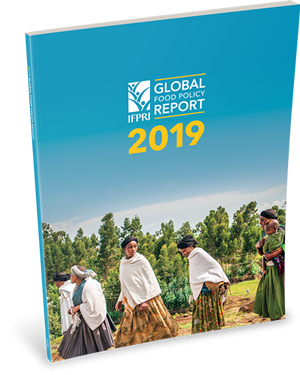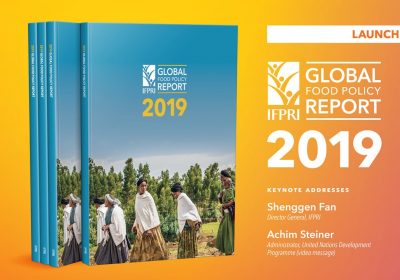
By Ann Marie Foley - 04 April, 2019

Global Food Policy Report 2019
Rural areas are in crisis in many parts of the world with over two-thirds of the world’s poor living outside of towns. This is threatening the progress toward Sustainable Development Goals (SDGs), global climate targets, and improved food and nutrition security, according to the 2019 Global Food Policy Report (GFPR).
The report by the International Food Policy Research Institute (IFPRI)* states that people in rural areas suffer from hunger and malnutrition, persistent poverty, limited economic opportunities and environmental degradation, compared to urban areas.
Rural areas have an environmental crisis in China, a severe agrarian crisis in India, and an acute shortage of jobs for the growing youth populations in Africa. The report highlights policies, institutions and investments that can transform rural areas into vibrant and healthy places to live, work and raise families.
“Revitalizing rural areas can stimulate economic growth and begin to address the crises in developing countries, and also tackle challenges holding back achievement of the SDGs and climate goals by 2030,” said Shenggen Fan, Director General, IFPRI. “Rural revitalization is timely, achievable, and, most important, critical to ending hunger and malnutrition in just over a decade.”
A majority of the world’s poor live in rural areas: rural populations account for 45.3 per cent of the world’s total population, but 70 per cent of the world’s extremely poor. The global poverty rate in rural areas is currently 17 per cent, more than double the urban poverty rate of 7 per cent.
“Rural transformation requires a holistic economic approach to connect rural and urban economies. Strengthening these connections can spur growth and diversification in the farm and non-farm sectors, closing socio-economic and quality-of-life gaps between urban and rural areas,” said Achim Steiner, Administrator, United Nations Development Programme and co-author of the lead chapter in the report.
The report recommends revitalizing rural areas, with a focus on five building blocks: creating farm and non-farm rural employment opportunities; achieving gender equality; addressing environmental challenges; improving access to energy; and investing in good governance.
Job creation is critical to reducing poverty in rural areas, especially in the rural areas of Africa south of the Sahara, where poverty is high and youth populations are large. Policies that encourage investments in rural transport networks, telecommunications and human capital in African countries can prepare rural young people for new jobs in rural and urban areas, and bridge the rural–urban gap, according to the report.
There is rapid urbanization in Africa, but this is creating new opportunities for rural transformation and revitalization, mainly due to growing demand for food in urban areas and investments in new staple food processing technologies.
In South Asia there is a greater emphasis on growth in rural employment and agricultural productivity by strengthening of the rural agriculture-based non-farm economy.
To ensure everyone can benefit from growth and transformation of rural areas, the report recommends empowering women to improve agricultural productivity. Also in rural environments that need to be restored, rural residents can become custodians of natural resources.
The report identifies that proper governance is critical, including appropriate and predictable laws and regulations; effective policy implementation and enforcement; and accountability of those in positions of power and authority.
The report is the latest in an annual analysis of developments in food policy around the developing world, based on the most recent available evidence.
“With perseverance, 2019 can become the year when the will to eliminate hunger and malnutrition finally gathers momentum, forging a bright future for poor people around the world,” said Shenggen Fan.
For more information on the report see http://gfpr.ifpri.info/ or visit www.ifpri.org.
*International Food Policy Research Institute (IFPRI) seeks solutions for ending hunger and poverty, with particular emphasis on low-income countries and on the poorer groups in those countries.